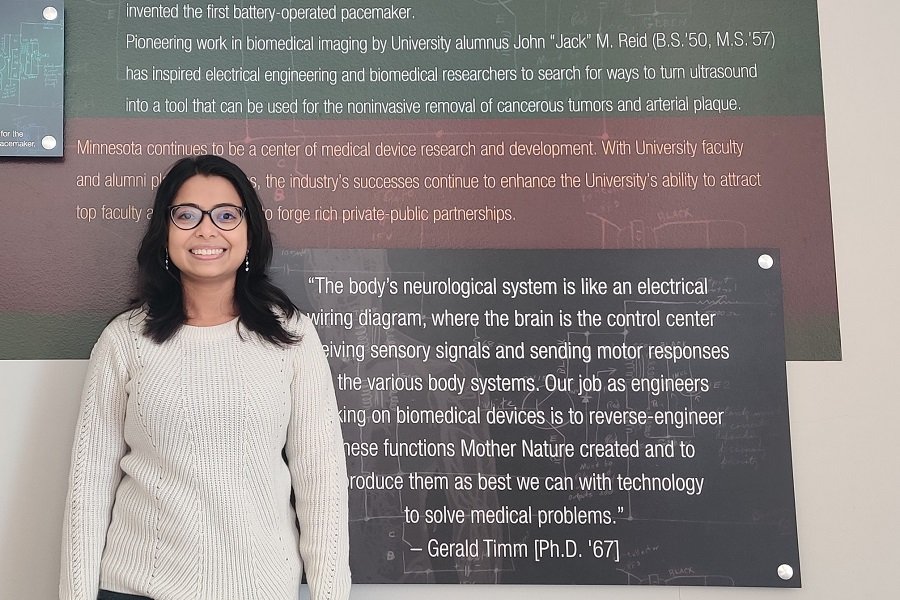Renata Saha receives 2022-23 MnDRIVE Graduate Fellowship

Doctoral candidate Renata Saha is a recipient of the 2022-2023 MnDRIVE Graduate Fellowship in Neuromodulation. Funded by the Brain Conditions area of the Minnesota Discovery, Research and InnoVation Economy initiative, the fellowship aims to promote excellence in graduate training by supporting outstanding graduate students specializing in neuromodulation. Saha is working on her doctoral research under the guidance of Distinguished McKnight University Professor and Robert F. Hartmann Chair Jian-Ping Wang.
The MnDRIVE fellowship will support Saha’s work on the development of implantable micrometer-sized coils (μcoils), and the investigation of their potential for treating neurological disorders at single-cell resolution. Titled, “Implantable Magnetic Microcoils (μcoils) For Cellular-Level Treatment of Neurological Disorders,” her research will report on two μcoil designs, the Magnetic Pen (MagPen), and the Magnetic Patch (MagPatch). The devices have been designed to facilitate spatially selective, targeted, and directional neuromodulation of brain tissues in both in vitro and in vivo experimental settings.
Micromagnetic stimulation, done in vitro, of the hippocampal neurons, and in vivo of the sciatic nerve in rats, using the MagPen prototype (dimensions 1 mm x 0.5 mm x 0.6 mm) have demonstrated its potential use as an alternative implantable treatment option for epilepsy and chronic pain. In tests undertaken in collaboration with neurosurgeons from Mayo Clinic, MN, the MagPen triggered dopamine release, a first for micromagnetic stimulation. The result opens up the possibility of the device being used as a treatment option for Parkinson’s Disease and depression. The MagPatch was designed to overcome the challenges posed by the MagPen, particularly its size and lack of multidimensional spatial control. Designed at the Minnesota Nanofabrication Center (MNC), each μcoil is 190 μm x 190 μm in area and made of biocompatible gold. A single MagPatch Array consists of six μcoils and theoretical studies of the prototype have shown it to be four times more spatially selective compared to the MagPen. Currently, its spatially selective stimulation potential is being investigated in human neuroblastoma. As part of her doctoral research, Saha designed, numerically simulated, and fabricated both μcoil prototypes including their electrical circuitry and mechanical designs.
Saha’s research has been steadily gaining traction. In 2019, she won the best poster award in the neural category at the University’s Institute for Engineering in Medicine (IEM) Annual Conference. In the same year, her research won the people’s choice award at the Magnetism and Magnetic Material conference (held in Las Vegas) in the Magnetism as Art showcase. In this, she was supported by a travel grant awarded by the Masonic Cancer Center’s Brain Tumor Program at the University. In 2020, two of her publications were featured on the front covers of the Journal of Physics D: Applied Physics (52, 465002) and the Journal of Applied Physics (126, 183902). She was also awarded the IEM Walter Barnes Lang Fellowship to support her research presentation at the Magnetic Carrier Meeting 2020 scheduled to be held in London, UK (canceled due to COVID-19 pandemic travel restrictions). Saha was also recognized with the Trusted Reviewer status (2020) and Outstanding Reviewer Award (2021) by the Institute of Physics for her professional service as a reviewer of international journal submissions. In November 2021, she received Cadence Design Systems’ Women in Technology Scholarship. Most recently, Saha was selected to attend iREDEFINE, an NSF-funded workshop held in New Orleans in March. Organized by the ECE Department Head Association (ECEDHA) across the United States and Canada, Saha is one of only 29 students selected across the two nations to attend the workshop.